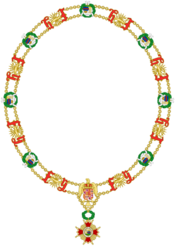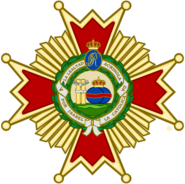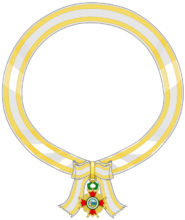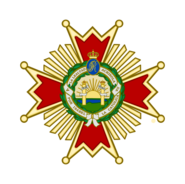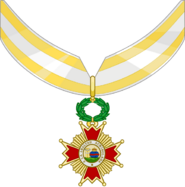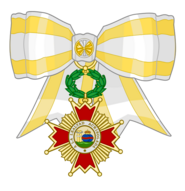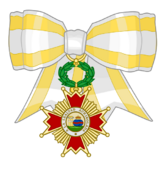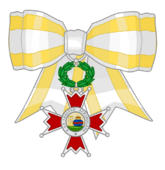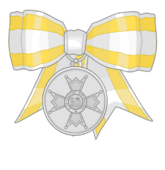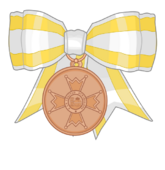Order of Isabella the Catholic facts for kids
Quick facts for kids Order of Isabella the Catholic |
|
|---|---|
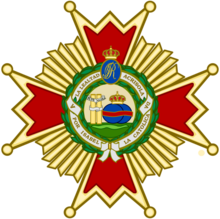
Breast star of the Order
|
|
| Awarded by the Spanish Monarch |
|
| Type | Order of merit, Knighthood |
| Established | 1815 |
| Motto | A LA LEALTAD ACRISOLADA (To Proven Loyalty) and POR ISABEL LA CATÓLICA (For Isabella the Catholic) |
| Awarded for | Actions that help Spain and the Crown |
| Status | Currently given out |
| Grand Master | King Felipe VI |
| Grand Chancellor | José Manuel Albares, Minister of Foreign Affairs |
| Grades |
|
| Precedence | |
| Next (higher) | The Order of Charles III is technically a higher honor, but it is mostly given to government ministers. |
| Next (lower) | Civil Order of Alfonso X, the Wise |
| Equivalent | Order of Civil Merit (for helping society) |
The Ribbons of the Order |
|
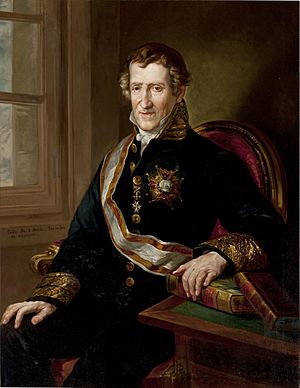
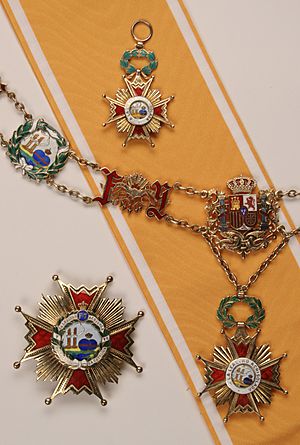
The Royal Order of Isabella the Catholic is a special award given by the Kingdom of Spain. It is a type of knighthood and one of Spain's most important honors. The award is given to people who have done amazing things to help Spain or to improve relationships with other countries.
The order is named after Queen Isabella I, a very important queen in Spanish history. The King of Spain is the Grand Master, or head, of the order. The Minister of Foreign Affairs acts as the Grand Chancellor, who helps manage it. People from Spain and other countries can receive this honor.
This award is very special and not given out often. Since it was created in 1815, only about 72,000 people have received it. This makes it a very rare and respected honor around the world.
Contents
History of the Order
King Ferdinand VII created the Order of Isabella the Catholic on March 14, 1815. He wanted to honor Queen Isabella I and reward people who were loyal to Spain. At first, it was mainly for people who did great things in Spain's territories in the Americas.
Changes Over Time
The order has changed several times throughout its history.
- 1847: After Spain lost most of its American territories, the order was reorganized. It was now given for services in Spain's overseas territories.
- 1873: When Spain became a republic for a short time, the order was stopped. The government felt it didn't fit with their new system.
- 1875: When the monarchy returned with King Alfonso XII, he brought the order back.
- Early 1900s: During the childhood of King Alfonso XIII, new rules were made. New awards like the Silver Cross and Medals were added.
- 1927: A new, even higher rank was created: the Knight of the Collar. This is the top honor in the order. It was also decided that women could receive the award.
- 1931: When Spain became a republic again, many royal orders were ended. However, the Order of Isabella the Catholic was allowed to continue.
- 1938: General Francisco Franco restored the order to its traditional purpose: to reward great service to Spain by both Spaniards and foreigners.
- 1998: The rules were updated to make sure there was no gender discrimination. The names for the ranks were made the same for both men and women.

Ranks and Officials
The King of Spain, currently Felipe VI, is the Grand Master of the order. The Minister of Foreign Affairs is the Grand Chancellor. Both of them must sign the documents that grant the award to someone.
People who receive the higher ranks of the order are given special titles. For example, those with the Grand Cross or Collar are called "His or Her Most Excellent Lord/Lady."
What are the different ranks?
The order has several levels, or grades. They are organized from the highest honor to the lowest.
- First Class
- Knight/Dame of the Collar (CoYC): The highest rank, for very important people.
- Knight/Dame Grand Cross (GYC): The second-highest rank.
- Second Class
- Commander by Number (CnYC)
- Commander (CYC)
- Third Class
- Officer's Cross (OYC)
- Fourth Class
- Knight's/Dame's Cross (+YC)
- Fifth Class
- Silver Cross
- Sixth Class
- Silver Medal
- Bronze Medal
Women who receive the award are called "Dames" instead of "Knights." For example, a woman might be a Dame of the Collar or a Dame Grand Cross.
What the Medals Look Like
The main decoration of the order is a cross with red enamel and a gold frame. At the center, a message is written on white enamel. It says "A La Lealtad Acrisolada" (To Proven Loyalty) and "Por Isabel la Católica" (For Isabella the Catholic).
Above the cross is a green laurel wreath. The award hangs from a ribbon that is yellow with a white stripe in the middle.
| Insignia | ||||||
| Collar | Collar Grade Star | Grand Cross | Grand Cross Star | Commander by Number | ||
| Commander | Dame-Commander Bow (Optional) |
Officer's Cross | Dame-Officer's Bow (Optional) |
Knight's Cross | ||
| Dame Bow (Optional) |
Silver Cross | Dame's Silver Cross Bow (Optional) |
Silver Medal | Dame's Silver Medal Bow (Optional) |
||
| Bronze Medal | Dame's Bronze Medal Bow (Optional) |
|||||
Images for kids
-
Samuel Morse, the inventor of the Morse code, wearing two different crosses from the order in 1866.
See also
 In Spanish: Orden de Isabel la Católica para niños
In Spanish: Orden de Isabel la Católica para niños
 | Kyle Baker |
 | Joseph Yoakum |
 | Laura Wheeler Waring |
 | Henry Ossawa Tanner |


